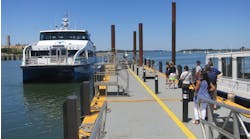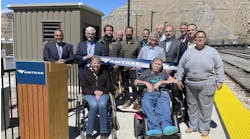MILWAUKEE -- A Milwaukee real estate developer whose brother leads an anti-streetcar activist group has proposed a regional rail system that he wants to put before voters if a referendum on the city’s streetcar project moves forward.
Brian Kliesmet, CEO of the newly formed Milwaukee Passenger Railway Co., is the younger brother of Chris Kliesmet, executive administrator of Citizens for Responsible Government, a group that opposes the Milwaukee streetcar. Brian Kliesmet’s proposed system, called the B-Line, would use existing rail lines owned by of the Union Pacific Railroad Co., Canadian Pacific Railway Ltd. and the Wisconsin Department of Transportation.
According to the proposal, 10 stations in Milwaukee would link to 12 more in neighborhoods across Milwaukee and Waukesha counties. The system would not require public subsidies in its annual operating budget, but at the B-Line’s outset, along with $220 million from private investors, a one-time, $180 million investment would be required from the state and participating cities and counties, including $55 million from Milwaukee.
The federal government allocated roughly the same figure, $54.9 million, for the $124 million, 2-mile downtown streetcar project, which the Milwaukee Common Council approved Wednesday. A procedural delay moved the council’s final vote on the project to Feb. 10, allowing time for opponents to gather signatures in an attempt to put the streetcar to a referendum vote.
“Out of respect to Mayor [Tom] Barrett, and out of respect to the process, we wanted to wait until yesterday’s vote to not be part of a plan to kill the streetcar,” Brian Kliesmet said Thursday. “It’s not our goal to replace the streetcar.”
Instead, he said he wants the regional rail system to be an option, along with the streetcar, for voters in a referendum.
“If it means we do the streetcar and this,” Brian Kliesmet said, “so be it.”
Officials at the Federal Transit Administration of the U.S. Department of Transportation said Friday they need more information before determining whether the $54.9 million in federal money, approved exclusively for a Milwaukee “downtown fixed guideway circulator,” could be used for a regional rail system with only a few stations downtown.
Chris Kliesmet said his brother has “a higher opinions of trains than I do,” but that the rail proposal has merit.
“As far as plans go, it’s a pretty good one,” Chris Kliesmet said. “It’s the proper use of rail — not a small number of people on a short haul, but a large number of people on the long haul. And it uses unused railways instead of tearing up the existing street.”
But Alderman Robert Bauman, who supports the streetcar, dismissed the proposal.
“This plan has been floating around for several years,” he said. “The capital costs are ridiculously understated. They propose to use railroad right-of-ways that do not even exist anymore. They plan to share existing mainline railroad lines without any clue of what it takes to operate on shared tracks.”
Milwaukee Passenger Rail Co. was incorporated Jan. 12. Though Brian Kliesmet declined to elaborate on the names and credentials of company board and advisory committee members, a press release named Michael Garven as president and Dave Henry as technical advisor. Brian Kliesmet said the project was the result of six years of planning.
The plan for the rail system lacks environmental studies, but Andy Kunz, president of the U.S. High Speed Rail Association, a national advocacy organization promoting high-speed and inter-city passenger rail, said many private railway proposals lack such studies at their outset.
“Part of the process is to put a proposal out there,” Kunz said, “and then to build political support.”
Still, Kunz added that he would not recommend canceling a public project based on a private proposal.
“Private-sector initiatives are good, but sometimes they end up not getting their funding,” he said. “You would’t want to halt a public project thinking the private project is a substitute, but then the private project never gets off the ground.”
In addition to $55 million from Milwaukee, the B-Line would require $1 million to $6 million from neighboring cities. Brian Kliesmet said Milwaukee’s proposed contribution is based on a formula that includes the number of stations, projected rising real estate values, job growth, population and acres of infill.
Brian Kliesmet has never been a member of Citizens for Responsible Government and has not participated in any of its anti-streetcar activism, both Kliesmet brothers said. But Citizens for Responsible Government is listed in the acknowledgments of the B-Line’s Coordinated Economic Development Plan.
Bauman said the proposal is just the latest strategy from the anti-streetcar crowd.
“These streetcar opponents,” he said, “are now just throwing anything against the wall in the hope it will stick.”


